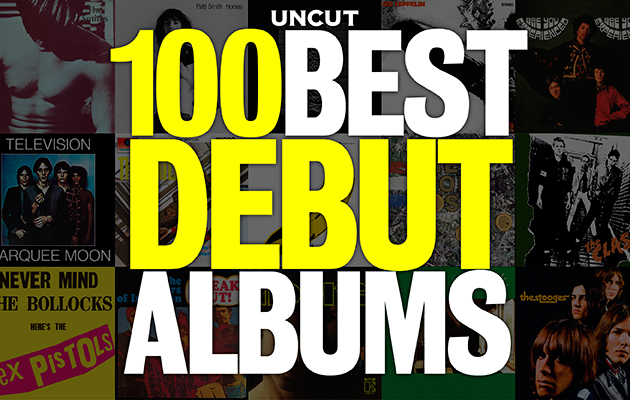Uncut presents 100 startling bursts of glory that revealed rock’s major players and revolutionised the world of music… Originally published in Uncut's August 2006 issue (Take 111). _______________ Presley’s first record back in March 1956 and the recent debut of the Arctic Monkeys, the faste...
77 EMINEM
The Slim Shady LP (1999)
Joyously un-PC, mentored by Dr Dre, Marshall Mathers’ debut laced trailer-park alienation with a lacerating wit to match King Ad-Rock and Flavor Flav.
Best track: “My Name Is”
____________________
76 GUNS N’ ROSES
Appetite For Destruction (1987)
Big-haired LA rivals were blown away by this ferocious, punk-meets-Zep amalgam. US No 1 “Sweet Child O’ Mine” was a brief distraction from the LP’s robot-rape sleeve, and attendant controversies that saw the band heading for self-destruction.
Best track: “Paradise City”
____________________
75 THE LA’S
The La’s (1990)
The sort of gritty pop record only Liverpool can produce: dripping with tunes but as tough as tungsten. Its melodic menace paved the way for Oasis, while Lee Mavers hinted at his own future on “Son Of A Gun”.
Best track: “Looking Glass”
____________________
74 KATE BUSH
The Kick Inside (1978)
Discovered by Dave Gilmour, the 19-year-old Bush had astonishing ambition from the off. Coating a myriad of influences in the weird and dramatic, her self-penned debut was remarkable for her emotive, swooping soprano, best heard on No 1 hit “Wuthering Heights”.
Best track: “Man With The Child In His Eyes”
____________________
73 PAVEMENT
Slanted And Enchanted (1992)
Pavement had built up a hipster mystique through their singles, but here they caught a post-grunge tailwind to become the decade’s paradigmatic college rock band. Slanted triumphed through a slackly chaotic pop sensibility and Stephen Malkmus’ lyrics, which could break your heart without giving you the faintest idea what they were about.
Best track: “Here”
____________________
72 THE STROKES
Is This It (2001)
Coaxing their nervy ramalama into three-minute spasms, the NY quintet may have looked like Vogue delinquents, but sounded equal parts Detroit ’69, NYC ’76 and skinny ’80s new wave. Their rediscovery of rock’s primal pulse in the age of superstar DJs seemed revolutionary and they inspired a new generation of guitar bands.
Best track: “Soma”
Fab Moretti on how The Strokes found the perfect NY sound…
UNCUT: Why did Is This It have such a huge impact?
MORETTI: We brought back the band vibe: the unity of the gang.
Did you see the parallels between yourselves and the ’70s NY bands?
We liked a handful of bands from that scene, but we never recognised the same unifying force in New York.
The hype suggested you came out of nowhere, but you’d been gigging solidly by summer 2000. How easy was the debut to make?
It was difficult in that we had to find the perfect sound and producer. We wanted
to establish a relationship with someone we trusted. Once we’d found Gordon [Raphael], it was easy to lay it down. We’d been playing these songs for months, so we already had the arrangements. The only thing we had to seek out was a sound that best represented the vibe of the songs.
You recorded it in a studio under the sidewalk at Avenue A and Second Street. Was that crucial?
Yes, although it wasn’t intrinsically tied to the neighbourhood. But just being in a basement and then being able to go and listen to the music in a bar across the street where we’d befriended the staff, all played a part in how the album sounded.
Did you receive the same reaction in the US as you did here?
The critics were pretty nice about us, but it’s a whole different set of criteria there. Because of the scale of the place, it’s much more difficult to break the United States than the UK, where word of mouth is so much more influential. The UK populace takes greater pride in discovering its own music, rather than being spoon-fed by some conglomerate like MTV.
Prior to your first UK gigs, the pressure to deliver must have been enormous…
We were very aware of the press reaction. The way our manager Ryan [Gentles] made it seem was that we’d come off the plane and it’d be like The Beatles in America, waving for a huge fucking crowd that’d come out to meet us. But it wasn’t like that at all. We got in kinda unnoticed, until the night of the show. We felt like nameless warriors trying to promote our music.
Touring and promoting it seemed to grind the band down. Did the strain have a bearing on the next album?
I’m sure it did. You try to ignore it as much as possible, but you’re always influenced by what people say. We felt like we were on a never-ending tour. After we recorded Room On Fire [2003], we made the decision to slow down a little. You split your time between touring and recording new records, so it feels like a never-ending cycle of fucking hard work and pressure. In retrospect, Room On Fire was rushed. After that, we decided to take it easier and make the third record [2006’s First Impressions Of Earth] sound exactly like we wanted it to.



